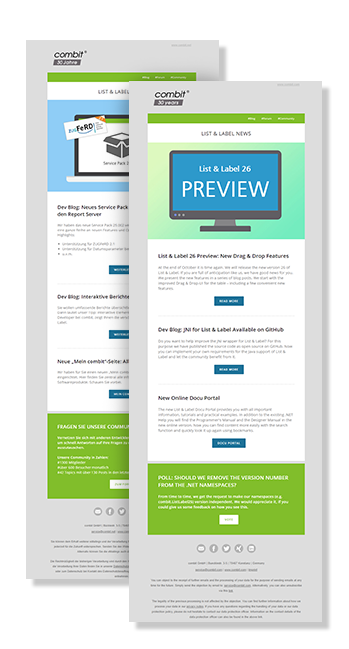QR codes have extremely good error correction. This can be used to add design elements to these codes or to vary the shape and size of the individual modules in order to achieve graphic effects. Previously, List & Label could output standard QR codes. With version 30, there are a number of new options for the code.
In LL21, we improved the Drag & Drop behavior thoroughly. However there was one thing still missing. When dropping e.g. a date field, at times you don't need the actual date in the report but rather e.g. the year. The same for numerical values – do you want decimals? If yes, how many? Do you require a local formatting? Or a currency symbol? While you can easily achieve any of these formattings using simple formulas or the "Format" property, you have to do just that. So drag and drop is not the no-brainer it is supposed to be in a perfect world. In LL23, the world will actually become a little more perfect.
Many things can often be implemented significantly easier and faster in managed code than in unmanaged code, such as with Delphi or C++. Sometimes, there already exist ready-made .NET modules which contain the desired requirements and which need to be used in your own unmanaged application. But the question then is: How can a .NET module be made accessible to an unmanaged system?
Continuing the journey of improving the performance, we decided to tweak a bit on the printing side as well. These optimizations help when using the same table several times with different fields. Think of a tabular report with some charts and a crosstab. Typically you have different views on your data in these objects. For these cases, the improvement is huge – I mean really huge.
Historically, List & Label has always been working without a database in the background. During the years, we've added powerful databinding to the components, however at the core, the principle stayed the same: your application (or the databinding layer) passes all available data before opening the Designer.
Today, I’d like to outline a few more minor new features of LL22 before they get lost in the upcoming blog posts on LL23. There are still plenty of nifty things in LL22 to discover that I haven’t blogged about yet.
Have you ever stumbled across TTFHW? This is an important nerd metric, meaning "time to first hello world". Basically it tells you how long it will take you as a developer to get to your first hello world success using a platform / API.
This is a major, bold new addition that will be available with List & Label 23. Currently the combit Report Server is available as a standalone out-of-the-box, self-service reporting solution. You can configure data sources, ad-hoc-design your reports, preview in your browser, export reports to a huge variety of formats or schedule email blasts. All of this in a responsive web application that works on any device. Starting with version 23, this server product will be included in the List & Label Enterprise Edition.
One of the nice parts of my job is getting around quite often. Through the years, I've held some hundred presentations. At developer conferences, user group meetings and our own roadshows (the next will happen this fall). I thought I'll share some hints and tools I've found valuable.
Today marks the launch of Microsoft Visual Studio 2017. We're also celebrating 15 years of .NET and 20 years of Visual Studio. It's been a long way! Actually, I had the honor to attend the VS Live in San Francisco when .NET was released.
Years ago I started developing a class to simplify the integration of List & Label into Xbase++ which I used for all my client's apps. The range of functionality grew with every new task. By now it supports real data preview which is handled in a separate thread.









